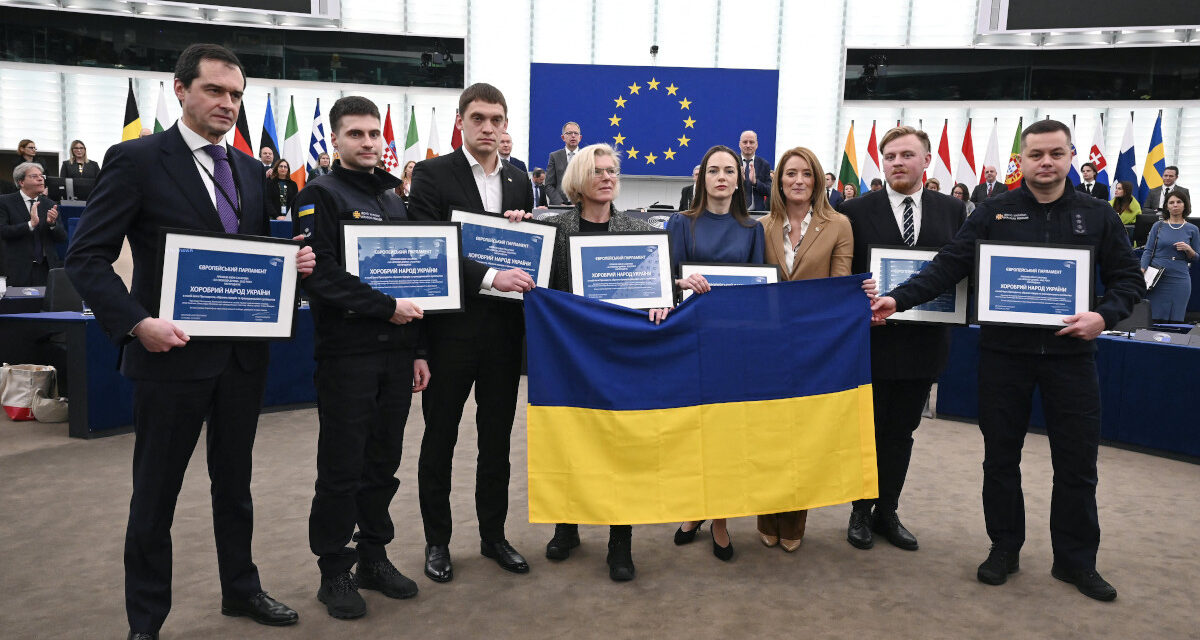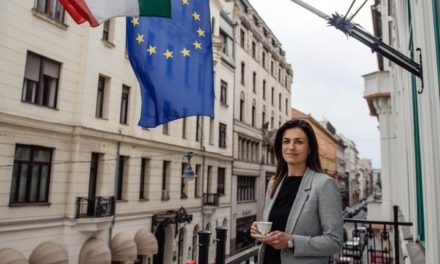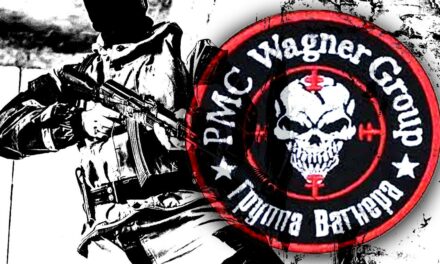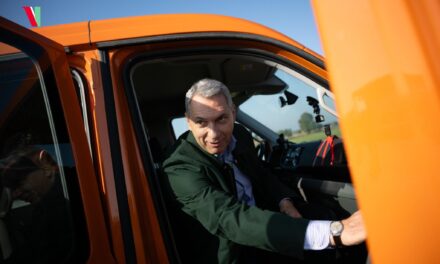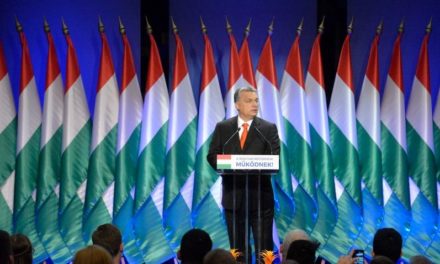"Brave people of Ukraine" demanded more weapons, more effective sanctions and the creation of an International Criminal Court at the European Parliament award ceremony.
If we remember - in addition to Sean Penn's Oscar and Time magazine's "man of the year" title - this year the Ukrainian president (and his people) also received the EU's most prestigious human rights award, the award named after the Russian nuclear physicist. Reporting from Strasbourg.
The European Parliament's Sakharov prize for freedom of thought was presented on Wednesday in the EP building in Strasbourg to the winner, who, based on the decision of the awarding body, became the "brave people of Ukraine", more specifically, the Ukrainian president who stood up against Russian aggression, the elected leaders of Ukraine and representatives of civil society. Volodymyr Zelenskiy entered the plenary session of the parliament via video from Kyiv, and after his short speech, the MEPs stood and applauded the representatives of the Ukrainian people present.
Roberta Metsola, the president of the European Parliament, praised the heroism of the Ukrainian people at the press conference held after the award ceremony and promised that Europe will not forget Ukraine. He pointed out that
the European Council will finalize the 18 billion euro financial assistance voted for Ukraine this week,
which will be available to Ukraine from the beginning of January and is ready to send demining equipment and will help Ukraine's western integration. The president drew attention to the fact that Putin's goal is to divide the EU member states, therefore, in the case of the war in Ukraine, in helping the Ukrainian people, unquestionable EU unity is needed, and as he added, in this case, unity was created.
In her acceptance speech, human rights activist Oleksandra Matviychuk, president of the Ukrainian Center for Civil Liberties, believed that Putin wants to demonstrate that human rights do not protect us in times of war, and that the Russian army knowingly violates human rights and the international rules of warfare. Matvijchuk requested EU support for three things:
he called for new weapons, new sanctions and justice.
As he said, delays in arms shipments are resulting in the deaths of more and more Ukrainian residents; a system of sanctions is needed at a level that prevents war financing in the short term; and the vicious cycle of impunity must be broken; after the war in Ukraine, an International Criminal Court must be set up to investigate the actions of the Russian political and military leadership and Russian soldiers who committed crimes.
Ivan Fedorov, the mayor of the city of Melitopol, declared: the Ukrainian people will resist to the end, they will not give up, and only victory will be acceptable to them. He also emphasized that they need more weapons and military equipment,
the goal is to liberate the population of the occupied territories.
The names of the three finalists of the Sakharov Prize were announced on October 13 by the EP's joint committee on foreign affairs and development, and the name of the winner was announced by the EP Presidents' Conference on October 19. On Tuesday, before the award gala, the three finalists, the representatives of the Ukrainian people, the wife of Wikileaks founder Julian Assange and the president of the Colombian Justice Commission held a press conference.
There, human rights activist Oleksandra Matvijchuk spoke about how the Ukrainian Civil Liberties Center tried to date the war crimes and human rights violations committed by the Russian army. When asked about Ukraine's future, the lawyer said: Ukrainians have no choice but to resist, because "we are fighting not only for our territory, but also for the people living there." That is why he called Western military assistance the most important thing.
If they don't stop Putin in Ukraine, it will go on"
Matvijczuk concluded his speech.
In his speech, Ivan Fedorov, the mayor of Melitopol, a Ukrainian city currently occupied by the Russian army, recalled the events that began in March, as the Russian army and the Russian administration that came after it continuously took control of the city, transforming everyday life. 700 people were kidnapped and tortured in Melitopol, he added. When asked whether the territories occupied by the Russians will ever return to the authority of Ukraine, Fedorov said: Ukraine is a democratic state, with its own territory, the acquisition of territory by Russia through aggression is unacceptable.
We must take back our territories, otherwise we have no country.
Russia attacked our country, the Ukrainians did not accept this, they will defend their country," said the mayor, adding that the Russians have now understood that they cannot occupy the Ukrainian territories they plan to occupy, so they are now trying to convince the population with state propaganda.
Oleksandr Chekrihin, the head of the emergency service of the Ukrainian Disaster Management (SES), said that their units accompany the Ukrainian military units during the recapture and try to make the areas livable for civilian life again. As he said, less than 30 percent of the occupied territories are mined and contaminated with unexploded ordnance, so demining the lands during their recapture is the number one security task. Csekrihin asked for help from the West for this: the sending of robotics and modern equipment.
Julija Pajevszka, the founder of the "Taira Angels" evacuation medical unit, recalled what happened to her:
I am one of the many Ukrainians who have been kidnapped, illegally detained and tortured”.
The medical specialist said: the Russians use beatings and electric shocks during interrogations, and they tell every prisoner that Ukraine does not exist, Zelensky is fleeing to the West, and they will do whatever they want with the prisoner, because no one will remember him and there will be no accountability. According to Pajevska, there is no law in the occupied territories, the occupiers can do anything without consequences, the Russians are not interested in international conventions on prisoners of war.
Yaroslav Bozsko, a representative of the Yellow Ribbon civil resistance movement, spoke about the activities of the resistance network operating in Ukrainian cities.
There can be no compromise with the Russians, because there is no compromise with the devil"
- he stated to the journalists, and then explained that the Russians are financing the war with the money from their energy contracts, so the EU member states should cut off all economic relations with Russia so that they don't have any income for this.
Stella Assange, the wife and lawyer of the other Sakharov Prize nominee, Julian Assange, drew attention to the importance of the WikiLeaks documents: the investigative portal exposed tens of thousands of human rights violations and war crimes in Iraq. As she said, her husband
he was prosecuted as an editor-publisher, even though the information he published was information of public interest.
Assange is not an American citizen, so his extradition would be illegal, his case is "a prominent serious state attack on press freedom, this is a politically motivated case", emphasized Stella Assange, who added that her husband is not coping well with the many years of imprisonment, currently in London's Belmarsh he is under investigation in prison and is fighting extradition to the United States.
The third finalist candidate, the president of the Colombian Justice Commission, Francisco de Roux, drew attention to the fact that wars degrade the quality of human life to a terrible extent; wherever an armed conflict rears its head, human suffering immediately appears. The Judicial Commission was created after the peace agreement that ended the Colombian civil war in 2016 with the aim of establishing and proving specific human rights violations committed during the fighting.
Every year, the European Parliament awards the Sakharov Prize for freedom of thought and opinion. The award, established in 1988, honors individuals or groups who perform outstanding activities for the protection of human and fundamental rights. The prize comes with a bonus of 50,000 euros.
Mandiner, 2022 plus
Featured image: FREDERICK FLORIN / AFP

